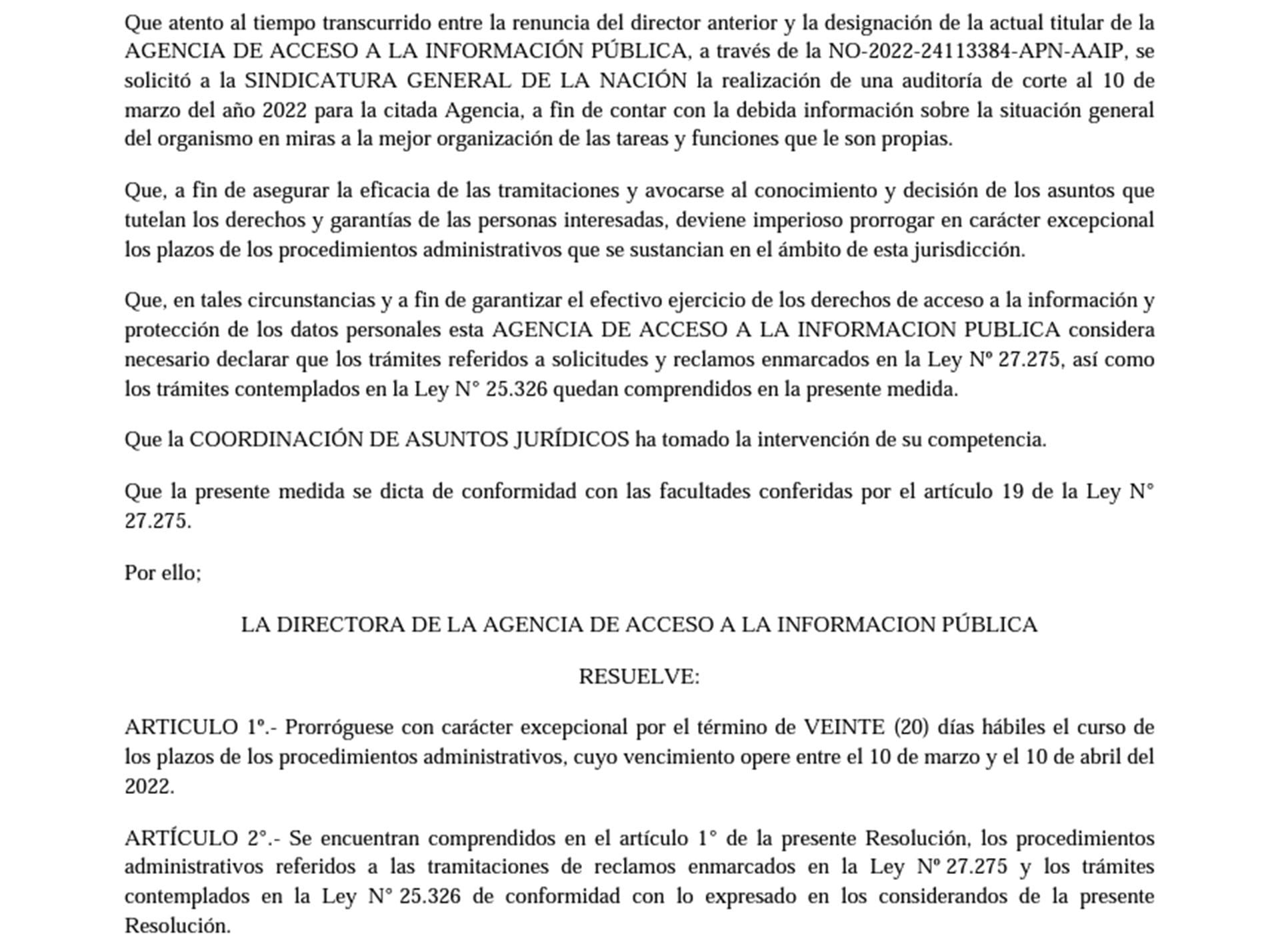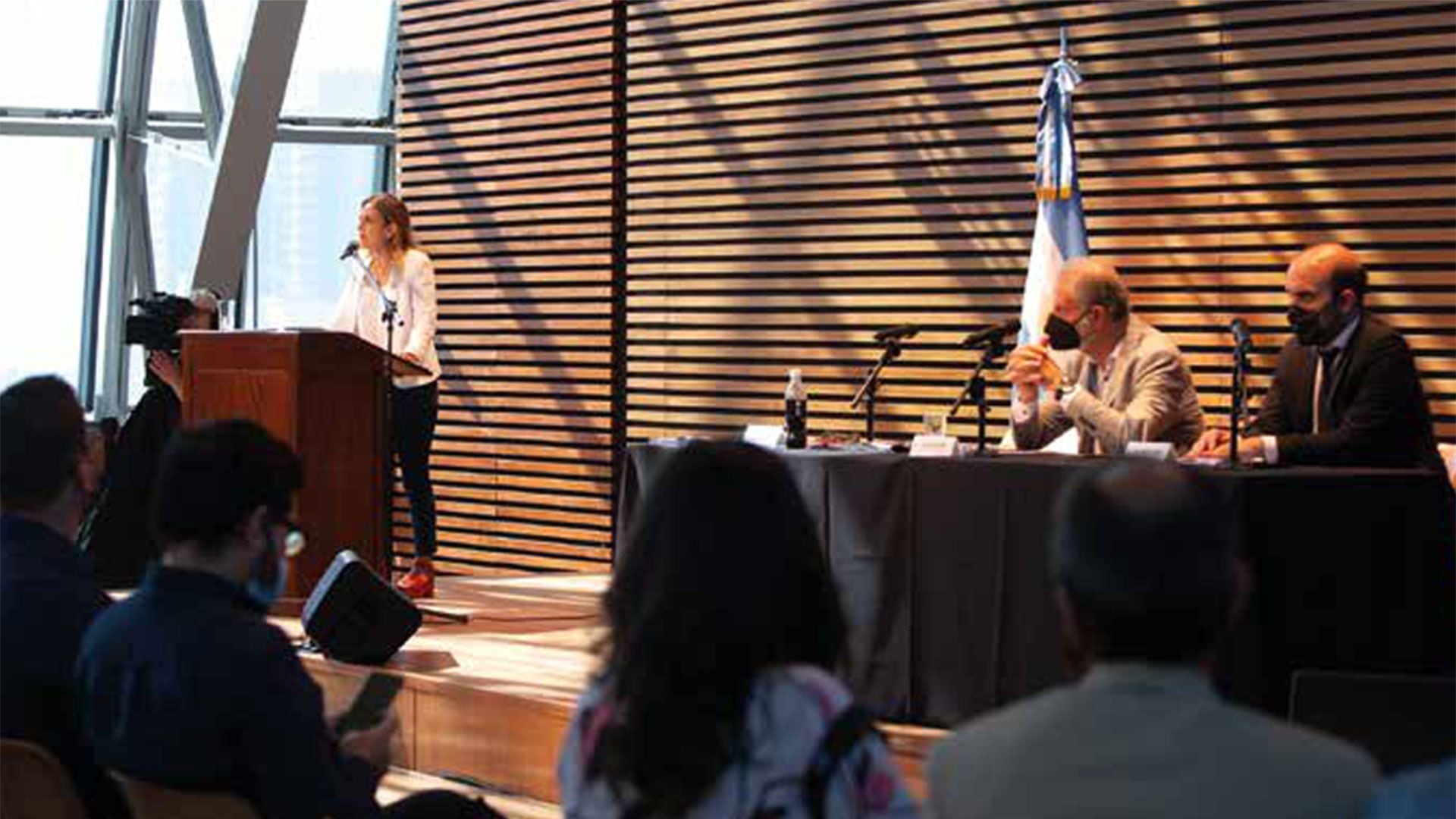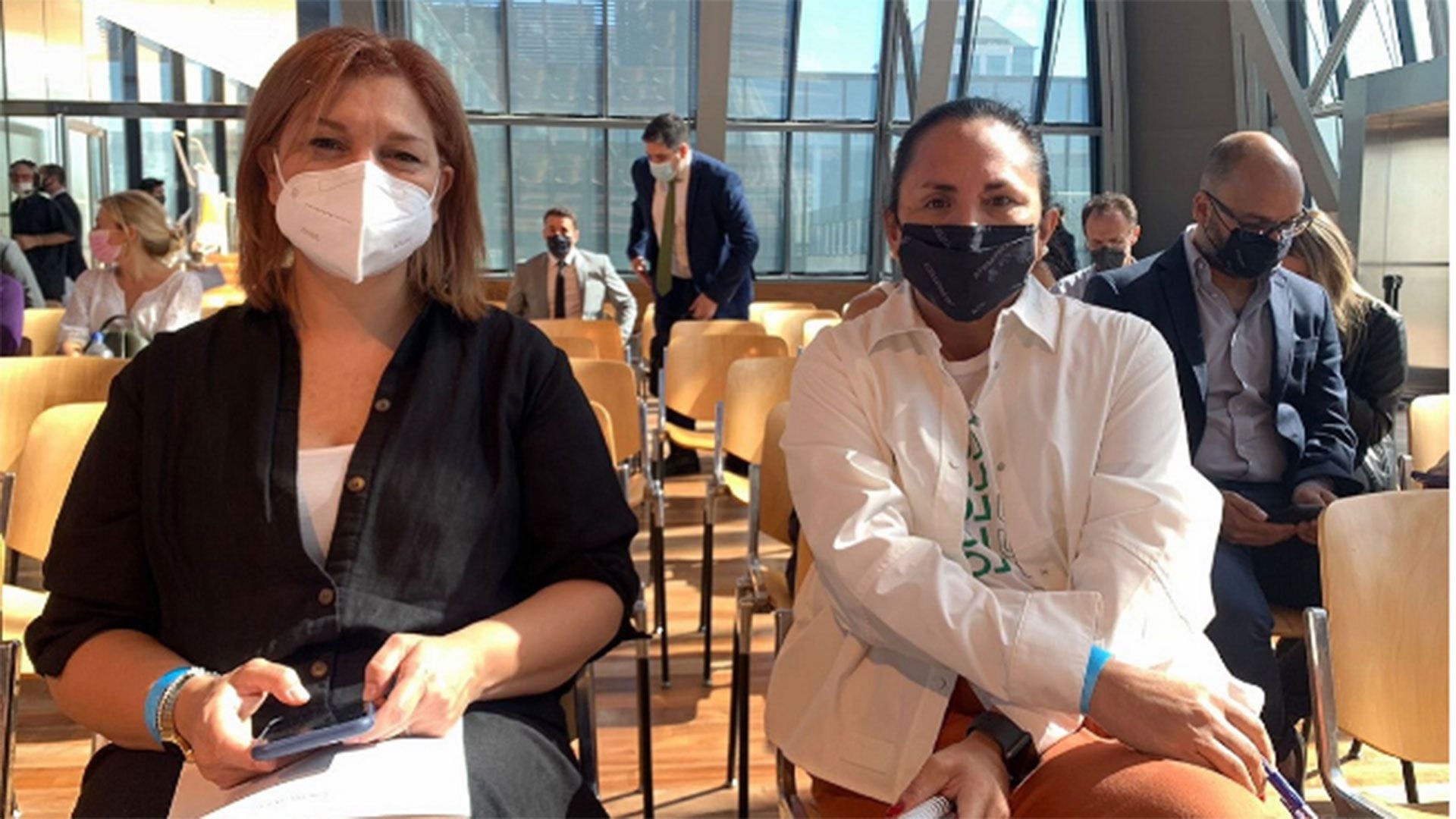
Just four days after her appointment, the new head of the Agency for Access to Public Information (AAIP), Beatriz De Anchorena, ordered to extend the administrative deadlines by 20 working days, between March 10 and April 10, for the agency to process and respond to requests and complaints to the Agency against the non-compliance by agencies of the Executive Branch to provide the requested information.
This decision — which was not published in the Official Gazette, but in the Regulations section of the Agency's website last week — suspended the deadlines set by a national law such as that of Access to Public Information, which guarantees a fundamental human right, and generated his first criminal complaint, and forceful questions from the opposition.
The presentation in the Federal Justice was made by Fundación Apolo, led by Yamil Santoro, for “breach of public official duties” and “abuse of authority”. At the same time, deputies from Juntos called on him to back down with the measure and filed a request for reports in the lower house, prompted by the national deputy Karina Banfi.
The Administrative Resolution of the AAIP, the first since the assumption of De Anchorena, used as an argument for the one-month suspension of the validity of the deadlines established in the Law on Access to Information, the need to carry out an audit by the General Audit Office of the Nation (SIGEN, an agency of the Executive Branch) “in order to obtain adequate information on the general situation of the agency with a view to the better organization of its own tasks and functions”.

“In order to ensure the effectiveness of the procedures and to focus on the knowledge and decision of matters that protect the rights and guarantees of the persons concerned, it is imperative to extend on an exceptional basis the deadlines of administrative procedures that take place within the scope of this jurisdiction”, says Resolution No. 1 signed by the brand new official.
However, it is not clear to what extent the SIGEN audit, which is cut to March 10, requires the extension of the response to the requests and complaints that came to the Agency, which should be answered from that date until April 10. The AAIP is the one that must intervene when agencies of the Executive Power do not provide the requested information, something increasingly common in Alberto Fernández's management. By way of example, the General Secretariat of the Presidency never responded to a request for Access to Information from the author of this note requesting the list of staff assigned to the first lady, Fabiola Yáñez, and their salaries, made on 9 August last year.
De Anchorena justified the measure by citing a report from the General Audit of the Nation (AGN), approved in November last year, referring to the period from January 2018 to June 2019, under the management of Eduardo Bertoni, the former director during Macri's administration, who resigned on January 1, 2021. Since then, the ownership of the AAIP became vacant and it was interim subrogated by the national director of Personal Data Protection, Eduardo Cimato.
According to that AGN report to which Infobae had access, there were “a number of problems in the management of the Agency that affected the activities, performance and achievement of its objectives”. According to the watchdog, the Agency “has not developed or implemented tools that tend to effectively guarantee access to public information, active transparency and the protection of personal data” provided for in the various regulations.
The report was prepared by the Management Control Department of the Non-Financial Sector of the AGN and presented by the government auditor Juan Ignacio Forlón, concluded that the organization had failures in the dissemination campaigns and that there were few requests to the Executive Branch. “It is evident that the Agency did not develop tools to efficiently guarantee access to public information,” he explained. He specified that “the dissemination campaigns did not have an adequate strategy, nor an impact measurement and did not reach all levels of society”. The report was made public two days before the public hearing to discuss his nomination, which took place on February 25 last. De Anchorena made no mention of this audit in his speech when defending his candidacy.

The Law on Access to Public Information - enacted in 2016 at the beginning of the Mauricio Macri government, after 15 years without progress in Congress due to Kirchnerism's refusal to treat it - establishes the obligation to provide the information requested by any citizen within 10 working days, with the possibility of an extension duly justified by others. If the agency does not comply, the applicant may turn to the Agency, which is the law enforcement authority.
Criminal and political questions
In the criminal complaint against De Anchorena filed last Monday by lawyers José Magioncalda, Juan Martín Fazio and Juan Pablo Pane, it is warned that Agency Resolution 1/2022 is “clearly illegitimate” because “the procedural deadlines extended by the accused arise from hierarchically higher standards, the modification of which total, partial, permanent or temporary, is prohibited from lower hierarchy norms”.
For the complainants, “the resolution taken conflicts with the objectives of the Agency for Access to Public Information in that it commits, with the alleged argument of carrying out an audit, the effective exercise of the right of access to information. The Agency for Access to Public Information has continued its management despite the alleged “acephaly”, since the signature had been delegated to the National Director for the Protection of Personal Data. In this way, management continued and no reasons are expressed that justify the need for an extension. Audits are part of normal administrative management, and the Public Administration is not suspended because of their conduct.” The presentation fell to Federal Court No. 7 by Sebastián Casanello.
The legal team of the Apolo Foundation also argued in the presentation: “Article 1 of Law 27,275 establishes for the subject matter at hand, among others, the principle of utmost urgency: 'Information must be published as quickly as possible and at times compatible with the preservation of its value'. How useful would it be for a citizen to receive the requested public information if, because of an unlawful extension, the time limits for taking action against administrative or criminal offenses of public officials are prescribed? What is the use of information obtained after an illegitimate extension, if it becomes useless because it is outdated, information obtained by a citizen, either to control power or to make decisions about his own life?
For Deputy Banfi, who promoted the Access to Public Information Act in 2016, and author of the request for Reports in the Lower House, “the Anchorena measure implies the violation of a fundamental human right that is enshrined in our Constitution and by international treaties. Access to information is a key component for freedom of thought and expression, fundamental to access other social, economic and cultural rights.” The draft resolution was accompanied by fifty deputies from the Juntos interbloc.

“This measure was not published in the Official Gazette of the Argentine Republic. Only the regulations section of the Agency's website was entered. Therefore, the Agency itself violates the obligations of publicity and active transparency of all administrative management provisions that emanate from it,” said Banfi on the grounds. The Juntos legislator stressed, in turn, that “Anchorena exceptionally extended all the processes processed by the Agency for Access to Information and Protection of Personal Data, deadlines stipulated by law and could never be modified by administrative resolution.”
Banfi was one of the deputies who participated in the public hearing held on 25 February at the Kirchner Cultural Center to challenge her candidacy. It was one of ten comments that the new head of the Agency had when her application was known.
“Unfortunately, we are again faced with a candidate who lacks the necessary credentials of suitability and impartiality that the law imposes to lead this watchdog. Ms. Anchorena has some academic and professional considerations, but she has no background on access to public information, much less the protection of personal data. Neither at work, nor academically. Today he is part of the chief of staff, he is part of the Patria Institute and his career refers to issues of public administration”.
Until being appointed as head of the Agency, De Anchorena was in charge of the Under-Secretariat for Management and Public Employment of the Chief of Cabinet of Ministers of the Nation. With a degree in Political Science from the National University of Buenos Aires, she holds a master's degree in Public Policy and Development Management from Georgetown University and the Universidad Nacional San Martín (UNSAM), and a PhD student in Social Sciences from the UBA. From the Chief of Staff, he promoted the creation of the National Directorate of Integrity and Transparency.
At the hearing, Banfi stated that Anchorena “has some academic and professional considerations but does not have any background on access to public information, much less on the protection of personal data. Neither at work, nor academically. Today he is part of the Chief of Staff, he is part of the Patria Institute and his career refers to issues of public administration”. He added: “The suitability of candidates cannot be presupposed but must be demonstrated by analyzing their background in an objective manner. In addition, what political capacity will you have to drive the amendment to the Personal Data Law? The one who did not want to discuss it in the Senate was the president of the Committee on Constitutional Affairs, which is also part of the Patria Institute,” he questioned in reference to Cristina Kirchner.
The new head of the Agency was also challenged by the Association for Civil Rights (ADC) for her affiliation with the Patria Institute, a party organization led by the current Vice-President of the Nation. “While his professional career in the public sector is recognized, his lack of experience in personal data and his belonging to the Patria Institute raise questions regarding his suitability and autonomy,” the ADC warned in its presentation.
Comments on his candidacy were also submitted by the Civil Association for Equality and Justice; the Vía Libre Foundation; the lawyer Magioncalda representing the Apolo Foundation; and the radical deputy Dolores Martínez, from Evolución; among others.
As a counterpart, De Anchorena received another 74 accessions from different fields, many academics, with a significant number coming from sectors related to the government. Among others, Alberto Edgardo Barbieri, rector of the University of Buenos Aires; the deputies of the Front of All Victoria Tolosa Paz and Ana Carolina Gaillard, and the deputy of the federal bloc, Alejandro “Topo” Rodríguez; Marcos Pedro Makón, director general of the Budget Office of the National Congress; Miriam Lewin, public defender for Audiovisual Communication Services; Marita Carballo, advisor to the Economic and Social Council 10; Carlos March, director of Knowledge Management at Fundación Avina and former executive director of the Citizen Power Foundation; Fernando Schapachnik, director of the Dr. Manuel Sadosky Foundation; Carolina Mera, dean of the Faculty of Social Sciences of the University of Buenos Aires; Carlos Greco, rector of the National University of General San Martín; Aníbal Jozami, rector of the National University of Tres de Febrero; Pablo Mario Narvaja, vice-rector of the National University of Lanús; and Sergio De Piero, director of the Institute of Social Sciences and Administration of the Arturo Jauretche National University, among others.
The official explanation
In response to the Infobae consultation, the AAIP sent an explanatory document stating that “it does not suspend the human right of access to public information enshrined in Law 27,275, but rather aims to ensure the proper functioning of the body”. He assures that “the Agency did not define a suspension of deadlines, but an exceptional extension, which responds to reasonable time patterns and that the rights of third parties are not prejudiced. Along these lines, the Legal Department of the Agency presented an opinion which endorsed the measure.”
The text states that “the Resolution was a product of the need to ensure the normal functioning of the body and to have adequate information on the general situation, taking into account that 14 months elapsed between the resignation of the previous director and the appointment of the current head.” And he cites the AGN report on the functioning of the Agency in the previous management. Although, the AAIP noted that “it was published on the same day that the public hearing was held for the appointment of Director of the Agency”, the report is dated November 16, 2021, and was approved at the session of the National Association of Auditors that took place on February 23.
KEEP READING:
Últimas Noticias
Debanhi Escobar: they secured the motel where she was found lifeless in a cistern

The oldest person in the world died at the age of 119

Macabre find in CDMX: they left a body bagged and tied in a taxi
The eagles of America will face Manchester City in a duel of legends. Here are the details

Why is it good to bring dogs out to know the world when they are puppies




